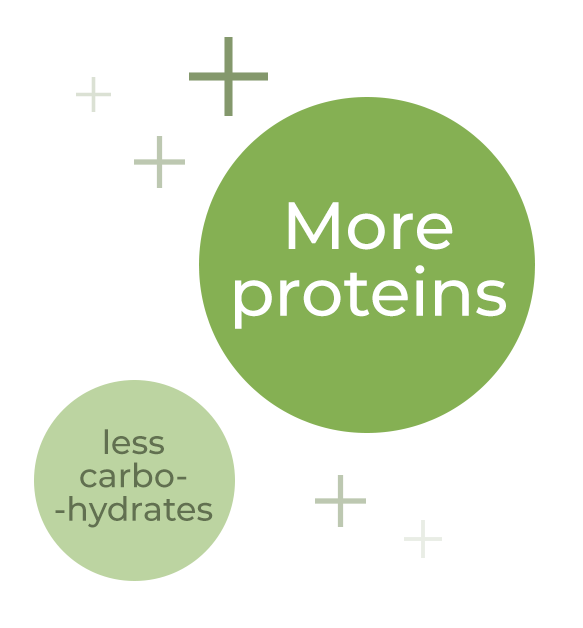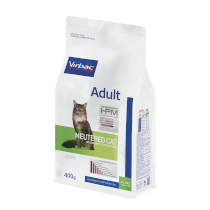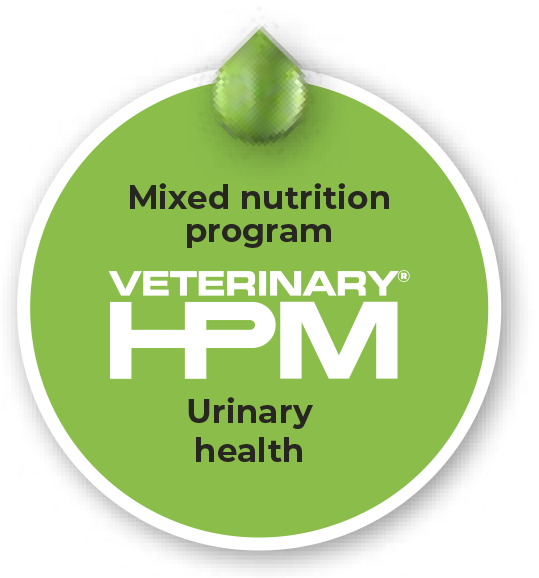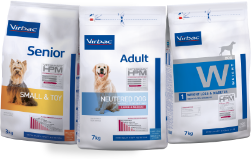
Feeding Your Cat After Neutering
WATCH OUT FOR WEIGHT GAIN
Neutering can predispose your cat to weight gain. In fact, neutered cats are twice as likely to become overweight compared to entire cats. This can be explained by hormonal changes which result in a reduction of their energy requirements as well as changes in feeding behaviour. The diet must therefore reflect this.
Monitor their weight
Maintaining ideal bodyweight can be a real challenge, but it is key to your cat’s health and well-being. Obesity increases the risk of developing health conditions such as diabetes, joint issues, heart disease, urinary issues, and more... It is therefore essential to adapt your cat's diet immediately after neutering.
Adult neutered cats are at higher risk of obesity and lower urinary tract disease
Neutering induces significant hormonal and metabolic changes. Energy requirements decrease by 25 to 30% whilst appetite increases. Without adapting their diet, neutered cats can gain weight very quickly after neutering, which could affect their health, quality of life and well-being. Urinary issues also are a significant concern, and are 2.5 to 7 times more common in neutered cats. Both conditions are closely linked. Indeed, overweight cats tend to drink less and go to the litter tray less frequently, which can result in urinary disorders. For these reasons, it is absolutely necessary to adapt their diet after neutering.
Adapted nutrition can make all the difference
Simply reducing the daily amount of food previously used before neutering is not a good solution, as it could lead to begging behaviour as well as nutritional deficiencies.
The solution is to adopt a diet that is specially formulated for neutered cats. The calorie content needs to be lower, whilst the overall volume of food per meal should remain roughly the same. The energy intake must come primarily from protein. Indeed, fat and carbohydrate intake, also sources of energy, will favour the development of fat mass and therefore should be present in limited amount. Protein also helps to maintain muscle mass and promote satiety in combination with dietary fibre. This is especially important after neutering when your cat's appetite increases.
Their diet should be adapted immediately after neutering. You can even anticipate the change and begin the gradual transition to the new diet a few days prior to neutering, in order to avoid the stress of changing diet during recovery.
VETERINARY HPM® ADULT Neutered cat: designed with your cat's health in mind
The VETERINARY HPM® Neutered range is specifically formulated to offer high palatability whilst making sure cats remain healthy.
Based on Low-Carbohydrate High-Protein formulation, our Neutered Cat diets are very close to cats’ natural preferences. They are designed to help your neutered cat keep an optimal body condition and a healthy urinary tract. Our diets contain a high amount of animal protein to help maintain muscle mass and stabilise urine pH. Our formula contains low levels of carbohydrate which limits the risks of weight gain and fat deposit.
Our Neutered Cat range covers the nutritional needs of cats throughout their life, from Junior to Senior age, with 4 dry diets and a new wet diet specifically designed for Adult Neutered cats: VETERINARY HPM® Adult Cat with Salmon.
Dry range:
Wet diet:
Adult Neutered Cat Wet with Salmon
Chunks in gravy, single pouches for optimal freshness, packed in box of 12.
9% Vegetable ingredients - no gluten - no grain
87% Pork, poultry, salmon ingredients
Our chunks in gravy are made of high quality ingredients. The very low carbohydrate, high protein formulation respects the needs of cats as carnivores. As well as excellent palatability, this diet will contribute to maintaining your neutered cat in good health:
- Provides high hydration
- Promotes urinary health
- Improves satiety effect
How to feed my cat with VETERINARY HPM® ADULT Neutered Cat food?
All our diets are complete and provide all the necessary nutrients.
You can choose to feed dry food only, wet food only, or a combination of the two, as part of the VETERINARY HPM® mixed nutrition programme. You can for example provide your cat with one pouch of chunks in gravy a day, alongside an adapted amount of kibbles.
What else can I do to support my cat’s body condition after neutering?
The first months after neutering are key so make sure you keep an eye on your cat's weight.
Make sure your cat gets plenty of exercise. Do not overfeed them and stick to the recommended daily rations. Weigh your cat regularly and see your vet if you notice any weight gain.
What else can I do to support my cat’s urinary health after neutering?
 |
Fresh water in suitable bowls
|
 |
Toileting habits are very important
|
 |
Avoid stress and boredom
|
 |
Monitor their bodyweight
|

VETERINARY HPM® can be purchased from vet practices, or online on the Virbac web store, for deliveries directly from us to your home!




.png)

.png)
.png)



